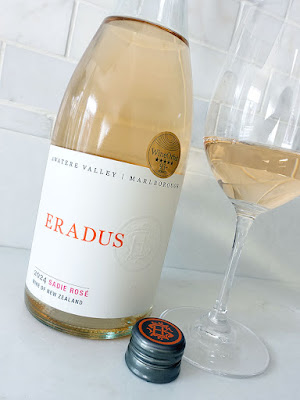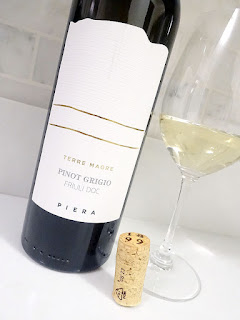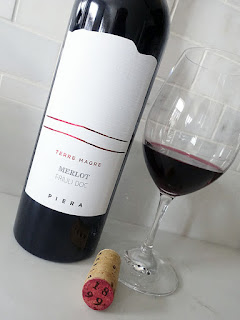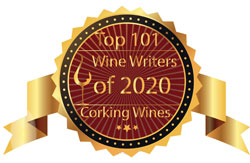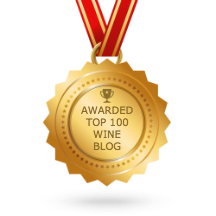red wine review is an excellent Pinot Noir from Martinborough in New Zealand. It made its debut at the LCBO in last month's LCBO VINTAGES New Release Collection.
It is produced by Escarpment Winery, a wine producer that was founded in 1999 as a joint venture between Larry and Sue McKenna of Martinborough, and Robert and Mem Kirby of Australia. However, the driving force of Escarpment was Larry, who grew up near South Australia's McLaren Vale and had been a pioneer winemaker in Martinborough since 1986.
Escarpment is located on Te Muna Road, in Martinborough's famed alluvial gravel soils that were formed by the Huangarua River over 20,000 years ago. The winery is named after the long, steep slope that lies at the end of a plateau, which is their unique place within Martinborough. Their site also has ancient alluvial soils that run deep beneath the land, while big, open skies stretch across the Wairarapa. Escarpment Winery's purpose is to translate the natural balance that exists here into wines that reflect these special attributes, this special part of Aotearoa, New Zealand.
Today, Escarpment Winery is one of New Zealand's most respected cool-climate wine producers. In 2019, Escarpment was acquired by Torbreck Vintners of Barossa Valley, South Australia. In 2022, Larry retired and left his legacy in the capable hands of Viticulturist, Rowan Hoskins and Winemaker, Tim Bourne.
The vision at Escarpment is to continue to produce wines that capture a unique sense of place. Situated in their unique place on Te Muna Road, their home vineyard has 24 hectares of distinctive alluvial gravel and terraced land that stretches out along the banks of the Huangarua River. The alluvial loam soil in this vineyard has very deep alluvial gravels layered over loam, a composition which ensures exceptional drainage and is one of the key prerequisites for nurturing and producing premium quality, healthy grape vines. Escarpment sources fruit for their wines from one of their four vineyards, as well as from growers around the Martinborough township with whom they have long-term relationships with.
Escarpment Winery has several lines of wines in its portfolio and is particularly known for its single vineyard expressions of Pinot Noir. This particular Pinot Noir is from their "Varietal Pinot" line, which is their commitment to the future expansion of their key varieties. Furthermore, the Varietal Pinot line is about exploring boundaries, a key philosophy that is exhibited in their winemaking approach.
This red wine is crafted with 100% Pinot Noir that was grown in the North Island district of Martinborough. Part of Escarpment Winery's ethos is to explore boundaries to create wines of interest and complexity. This wine brings together over three decades of winemaking experience to craft a Pinot Noir using traditional techniques from fruit grown on the Martinborough terrace. Upon arriving at the winery, the harvested grapes were destemmed into open-top vessels and fermented using indigenous yeast. The average time in vat was 23 days, after which the wine was pressed off and aged in predominately older French barriques for about 10 months, with 16% new French oak. Each parcel was vinified and matured separately, with the resulting wine a blend of 36 individual parcels, and was bottled without fining.
The 2023 vintage in Martinborough was a difficult one due to sustained wet weather and cyclone activity. The wet and cool conditions began in autumn 2022 and persisted right through to autumn 2023, which made all vineyard activities extremely difficult and expensive as more passes through the vineyard were required because growth continued throughout the season and disease pressure was immense. Crops were constantly thinned, and low temperatures and high soil moisture levels meant ripening was slow and protracted. Pinot Noir was in good condition because the varietal is later to budburst and ripen, and was thus less advanced when Cyclone Gabrielle hit. From a trying vintage, let's see how this 2023 Pinot Noir from Martinborough is tasting tonight...
Enclosed by screw cap. The highly engaging nose has medium-high intensity aromas with an intriguing mix of rose floral, earthy beet root, black spices, dark cherry, cranberry, and savoury minerals, plus strawberry accents. On the dry, light-to-medium bodied palate it shows impressive structure and textured tannins. Lovely, complex, and ripe flavours of black cherry, cranberry, strawberry, beet root, spices, and savoury minerals. Touch creamy on the mid-palate, which gives way to a mildly grippy back palate. Acids are crisp and juicy. It's well-balanced throughout with dark red berry notes tapering to savoury spice, and earthy minerals on the crisp finish, with excellent length. Should improve further with a few years in the cellar and drink well for at least 5+ years. Highly recommended buy! Score: 92+ pts
Other fine wines by Escarpment can be ordered through their Agent - Noble Estates Wines & Spirits.
It is produced by Escarpment Winery, a wine producer that was founded in 1999 as a joint venture between Larry and Sue McKenna of Martinborough, and Robert and Mem Kirby of Australia. However, the driving force of Escarpment was Larry, who grew up near South Australia's McLaren Vale and had been a pioneer winemaker in Martinborough since 1986.
Escarpment is located on Te Muna Road, in Martinborough's famed alluvial gravel soils that were formed by the Huangarua River over 20,000 years ago. The winery is named after the long, steep slope that lies at the end of a plateau, which is their unique place within Martinborough. Their site also has ancient alluvial soils that run deep beneath the land, while big, open skies stretch across the Wairarapa. Escarpment Winery's purpose is to translate the natural balance that exists here into wines that reflect these special attributes, this special part of Aotearoa, New Zealand.
Today, Escarpment Winery is one of New Zealand's most respected cool-climate wine producers. In 2019, Escarpment was acquired by Torbreck Vintners of Barossa Valley, South Australia. In 2022, Larry retired and left his legacy in the capable hands of Viticulturist, Rowan Hoskins and Winemaker, Tim Bourne.
The vision at Escarpment is to continue to produce wines that capture a unique sense of place. Situated in their unique place on Te Muna Road, their home vineyard has 24 hectares of distinctive alluvial gravel and terraced land that stretches out along the banks of the Huangarua River. The alluvial loam soil in this vineyard has very deep alluvial gravels layered over loam, a composition which ensures exceptional drainage and is one of the key prerequisites for nurturing and producing premium quality, healthy grape vines. Escarpment sources fruit for their wines from one of their four vineyards, as well as from growers around the Martinborough township with whom they have long-term relationships with.
Escarpment Winery has several lines of wines in its portfolio and is particularly known for its single vineyard expressions of Pinot Noir. This particular Pinot Noir is from their "Varietal Pinot" line, which is their commitment to the future expansion of their key varieties. Furthermore, the Varietal Pinot line is about exploring boundaries, a key philosophy that is exhibited in their winemaking approach.
This red wine is crafted with 100% Pinot Noir that was grown in the North Island district of Martinborough. Part of Escarpment Winery's ethos is to explore boundaries to create wines of interest and complexity. This wine brings together over three decades of winemaking experience to craft a Pinot Noir using traditional techniques from fruit grown on the Martinborough terrace. Upon arriving at the winery, the harvested grapes were destemmed into open-top vessels and fermented using indigenous yeast. The average time in vat was 23 days, after which the wine was pressed off and aged in predominately older French barriques for about 10 months, with 16% new French oak. Each parcel was vinified and matured separately, with the resulting wine a blend of 36 individual parcels, and was bottled without fining.
The 2023 vintage in Martinborough was a difficult one due to sustained wet weather and cyclone activity. The wet and cool conditions began in autumn 2022 and persisted right through to autumn 2023, which made all vineyard activities extremely difficult and expensive as more passes through the vineyard were required because growth continued throughout the season and disease pressure was immense. Crops were constantly thinned, and low temperatures and high soil moisture levels meant ripening was slow and protracted. Pinot Noir was in good condition because the varietal is later to budburst and ripen, and was thus less advanced when Cyclone Gabrielle hit. From a trying vintage, let's see how this 2023 Pinot Noir from Martinborough is tasting tonight...
Tasting Note:
ESCARPMENT NOIR PINOT NOIR 2023 - Martinborough, North Island, New Zealand (#41810) (XD) - $29.95Enclosed by screw cap. The highly engaging nose has medium-high intensity aromas with an intriguing mix of rose floral, earthy beet root, black spices, dark cherry, cranberry, and savoury minerals, plus strawberry accents. On the dry, light-to-medium bodied palate it shows impressive structure and textured tannins. Lovely, complex, and ripe flavours of black cherry, cranberry, strawberry, beet root, spices, and savoury minerals. Touch creamy on the mid-palate, which gives way to a mildly grippy back palate. Acids are crisp and juicy. It's well-balanced throughout with dark red berry notes tapering to savoury spice, and earthy minerals on the crisp finish, with excellent length. Should improve further with a few years in the cellar and drink well for at least 5+ years. Highly recommended buy! Score: 92+ pts
Other fine wines by Escarpment can be ordered through their Agent - Noble Estates Wines & Spirits.



